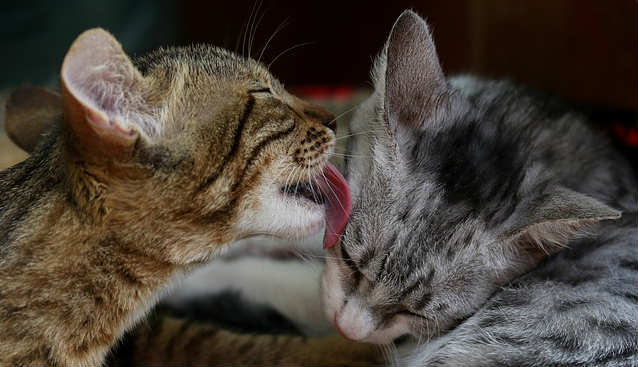What are some tips on how to help cats get along?
Original Question: Hi, please help! We have 2 resident cats (male 10 (Oliver) female 10 (Molly) both from shelters) Oliver has been here for 4 years and Molly 2 years. They get along okay, no fighting or anything. Now in December 2016 we took in a male cat 12 to 14 years old (original owner wasn't sure of exact age) because he was being left outside. At first there was the usual curiosity especially from Oliver when Murray first arrived and Molly really didn't care so much (she has issues of her own as she is a special needs cat) But it seems the two males just can't seem to get along. At first Oliver would come up once the TV room door was open to visit Murray but Murray would hide under the futon. Oliver would growl and then Murray would growl, this was in December/January. It’s still the same now where Murray will not come downstairs. If he does he makes a b-line to the basement crawl space and he hangs out there for the day or so. I still have his food water and litter box upstairs. Now in our bedroom (next to TV) I have put a second litter box in because I've noticed when Murray uses the TV room litter box Oliver would come up and Murray runs under the futon. Now it’s Murray that growls and Oliver stares at him. We also put a high spot for him in our bedroom to look out the window (books piled up with a comfy blanket for him). So this growling from Murray is still going on and Oliver stares and chases him so Murray goes under the futon. This is getting worse. I know you can't make cats like each other but if they could just relax around one another Murray could eventually come downstairs to hang out with the Oliver and Molly. What can I do? Help! - Paula
 Mar 4, 2018
Mar 4, 2018
Hi Paula,
Thanks for your question! Kudos to you for deciding to take care of these kitties and make them part of your family. This is a common problem in multi-cat households, so you are certainly not alone. First, I assume these kitties are spayed/neutered already because of their ages, but a reminder to any cat owners that spaying and neutering is important for preventing some unwanted or aggressive behaviors.
It sounds like Murray is quite the shy cat, while Oliver is the more confident one. It is important that you maintain a “safe space” for Murray so he can get away and relax on his own without having to worry about the other cat. Also, I like that you have provided multiple litter boxes in different locations. There is a general rule of thumb that says you should have one more box than cats in the house. So, in your case, it would be four if possible. I also suggest feeding the cats in separate areas – this way they will not feel the stress of competition during mealtimes.
There are also some pheromone products that help to calm cats and encourage them to accept changes in the environment. Your veterinarian can guide you further on these products. Another tip I have would be to take things slow, and as you said, do not expect them to like each other, rather, the goal should be for them to tolerate one another. Allow them short periods of access or interaction with one another, and if they do well, consider giving them a treat as a reward for a calm interaction. This might be as simple as sitting apart quietly in the same room.
You may also consider having a behavior consult. There are veterinarians that specialize in behavior issues, including inter-cat aggression. They will be able to develop a plan to ease the interactions between your cats.
Wishing you all the best!
Dr. Kim Hester


Disclaimer: healthcareforpets.com and its team of veterinarians and clinicians do not endorse any products, services, or recommended advice. All advice presented by our veterinarians, clinicians, tools, resources, etc is not meant to replace a regular physical exam and consultation with your primary veterinarian or other clinicians. We always encourage you to seek medical advice from your regular veterinarian.

